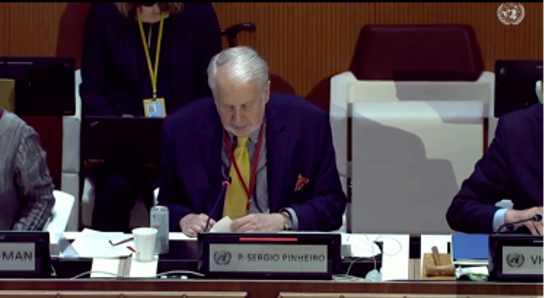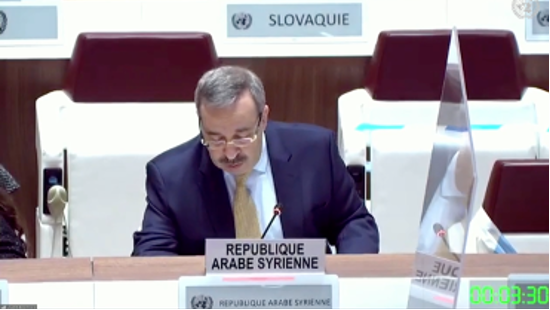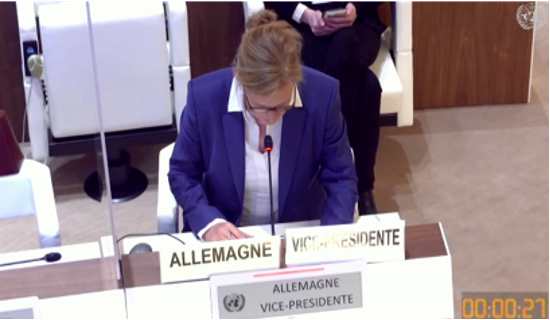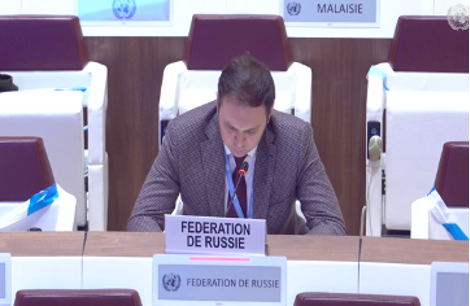49th Session of the Human Rights Council
28 February 2022 - 1 April 2022
Item 4: ID with Commission of Inquiry on Syrian Arab Republic
18 March 2022
By Sarah Tayara / GICJ
Executive summary
On 18th March 2022, the Human Rights Council held an Interactive Dialogue on the Commission of Inquiry (COI) on Syria to discuss the Commission’s most recent report on the human rights situation in the country. In March 2011, Syrians peacefully took to the streets, calling for greater freedom, dignity, and justice following years of human rights abuses. Peaceful protestors were swiftly met with violent repression from the Syrian government. As we enter the 12th year from the beginning of the conflict, the human rights situation remains bleak. More than 12 million people have been displaced from their homes. At least 400,000 people, with the real number unknown and likely much higher, have been killed. At least 150,000 are arbitrarily detained or have been forcibly removed and 90% of the country are living below the poverty line. The flagrant human rights abuses show no signs of ceasing. Since 2011, the Commission of Inquiry (COI) on Syria has produced 25 UN mandated reports documenting the grave violations of the most fundamental human rights in the country. In its reports, the COI relies on witness interviews, photographs, videos, and satellite imagery. Its efforts to carry out a full investigation remain hindered by the Syrian government denying the COI access into the country.
Report summary
The report, based on investigations between the 1st July 2021 and 31st of December 2021, highlights the devastating human rights situation in the country. It identifies several culpable parties responsible for committing grave violations in the conflict. In line with previous years, however, the Syrian government remains the main perpetrator of human rights abuses. Violations documented were wide ranging and siege tactics are still being used by pro-government forces against civilians. A 10-week siege and government offensive beginning in July 2021 temporarily displaced almost 40,000 civilians from their homes in Dar’a al-Balad, a neighbourhood in Daraa, killing and injuring thousands of others. The Commission also highlighted that weaponisation of humanitarian aid is being used as a tactic of war, with pro-government forces blocking humanitarian aid from accessing civilians who are most in need.
Moreover, indiscriminate violence against civilians persists in the country. The report highlights the culpability of several parties to the conflict, including Hay’at Tahrir As-sham (HTS) and the Syrian National Army. The most notable increase in violence, however, was attributed to government airstrikes of civilian areas in Idlib, and increased shelling in July and August across the North of the country. Reflecting on the tragedy of the Syrian conflict in general, many children were forced to bear the brunt of the attacks. The report also highlighted that enforced disappearances and arbitrary detentions remained a huge concern in the country. Across Syria, hundreds of thousands of civilians are unlawfully held in detention centres, forced to endure torture and inhumane and degrading treatment, often leading to death. The Syrian government also systematically fails to inform family members of the fate of their loved ones, relying on tactics of fear as a means of further repressing the population. The use of arbitrary detention as a means of punishment was also relied upon by HTS in the case of dissidents.
Despite the overall deterioration of human rights, the report did acknowledge that progress was made with regards to accountability in Syria. In January 2022, the German Koblenz Higher Regional Court’s issued a landmark verdict, finding the former director of the Syrian intelligence service ‘Branch 251’ guilty of crimes against humanity, murder, torture, deprivation of liberty, rape and sexual assault. In the Netherlands, a court convicted a former Jabhat al-Nusrah fighter for the murder of a Syrian soldier in 2012. A German prosecutor also found a Syrian doctor guilty of crimes against humanity including torture and murder at medical and detention facilities in Damascus and Homs.
The report recommended an immediate cessation of all attacks on civilians as well as an independent, impartial, and credible investigation into civilian casualties to establish a system of accountability and non-repetition for perpetrators of crimes. Moreover, in light of the deteriorating living conditions, the Commission has called for a review of the sanctions currently imposed on Syria. Despite humanitarian exemptions, the report finds that more is required to mitigate unintended consequences on the daily lives of the civilian population brought about by over compliance. Additionally, the COI called for an immediate end to all torture and other cruel inhumane, or degrading treatment in detention centres as well as an implementation of all feasible measures in line with UNSCR Resolution 24/74 to ensure the location of all those arbitrarily detained. Importantly, it was asserted that nothing less than a political solution brought about by a long-lasting, nationwide ceasefire will suffice.
Interactive Dialogue with the Chair of the Commission
 The interactive dialogue began with Mr Paulo Sergio Pinheiro, Chair of the Commission, presenting the report’s findings to the Council. Mr Pinheiro noted that the people of Syria had been forced to endure more than 11 years of crisis and conflict. As they enter the 12th year of the war, Syrians are suffering through unprecedented levels of hardship brought about by escalating violence, a plummeting economy, and a humanitarian disaster. He lamented the death of hundreds of thousands of civilians, the displacement of more than half of the pre-war population, the destruction of the country’s cities and infrastructure, and the state of more than 100,000 civilians who are missing or have been unlawfully detained. After enduring more than a decade of war and the global pandemic, Syria’s medical facilities were weak and unable to cope with the humanitarian demands of the conflict. Importantly, Mr Pinheiro stated that the Syrian conflict is far from being over.
The interactive dialogue began with Mr Paulo Sergio Pinheiro, Chair of the Commission, presenting the report’s findings to the Council. Mr Pinheiro noted that the people of Syria had been forced to endure more than 11 years of crisis and conflict. As they enter the 12th year of the war, Syrians are suffering through unprecedented levels of hardship brought about by escalating violence, a plummeting economy, and a humanitarian disaster. He lamented the death of hundreds of thousands of civilians, the displacement of more than half of the pre-war population, the destruction of the country’s cities and infrastructure, and the state of more than 100,000 civilians who are missing or have been unlawfully detained. After enduring more than a decade of war and the global pandemic, Syria’s medical facilities were weak and unable to cope with the humanitarian demands of the conflict. Importantly, Mr Pinheiro stated that the Syrian conflict is far from being over.
The Chair of the Commission also noted that Idlib and the northwest of Syria have been continuously targeted by Syrian and Russian forces, with dozens of children losing their lives as a result of such attacks. He condemned the inhumane practices of torture and ill-treatment of those forcibly disappeared and arbitrarily detained, as well as the dire situation of the more 60,000 detainees, 40,000 of which are children, in the al-Hol camp. Finally, Mr Pinheiro asserted that there was no military solution for the Syrian crisis. Anything less than a political solution would be insufficient. He concluded by quoting Secretary-General, Antonio Gutteres, saying “we must not lose hope, we must act now. We must show the courage and determination to move beyond rhetorical commitments to peace and to do all that is necessary to reach a negotiated political solution in line with Security Council resolution 22/54”.
Members of the Commission
Mr Hanny Megally, a member of the COI explored the notion of accountability in Syria. He explained that despite it being clear that the Syrian case could not be brought before the International Criminal Court via the Security Council, the utilisation of international jurisdiction is a viable route of bringing about accountability.
Ms Lynn Welchman, member of the Independent COI, focused on gender-based violence and violations of child rights, highlighting their link to the dreadful economic situation. With regards to the rights of the child, she stressed the situation in camps in northeast Syria, where 40,000 children are being held, as orphans or with their mothers. She urged the situation to be resolved in order to allow the children to grow up and enjoy a normal childhood.
 Mr Hussam Edin Aala, the representative of Syria, began his statement by reiterating the country’s rejection of the Commission’s mandate. He emphasised that the Commission was merely a platform for shaming Syria and making unfounded allegations against it with the aim of advancing the Council’s politicised agenda. Although the session is referred to as an Interactive Dialogue, the reality is that it is a unilaterally imposed proliferation of the Council’s polarisation which serves the narrow politics of the West. The representative continued by claiming that the Syrian conflict was based on terrorism and economic aggression against the Syrian state, aided by the US and its allies. He insisted that the UN continues to report and narrate stories which have nothing to do with the reality of the situation. He denounced the report as misleading, claiming that it ignores the major challenges facing Syria as a result of terrorism and the effect of the Universal Coercive Measures which prevent Syrians from accessing oil and resources. The representative went on to condemn the looting of Syrian resources by the American occupation, as well as Turkey’s weaponisation of access to water, all of which amounts to a contravention of the UN charter. Mr Aala reminded the council that Syria had completed its 3rd cycle of the Universal Periodic Review, pointing to the reports as evidence of the falsification of claims made against the Syrian government in the Commission’s report. He concluded his statement by calling on the Council to end its politicised mandate which lacked credibility and objectivity, and instead posed a threat to Syria’s national sovereignty and territorial integrity.
Mr Hussam Edin Aala, the representative of Syria, began his statement by reiterating the country’s rejection of the Commission’s mandate. He emphasised that the Commission was merely a platform for shaming Syria and making unfounded allegations against it with the aim of advancing the Council’s politicised agenda. Although the session is referred to as an Interactive Dialogue, the reality is that it is a unilaterally imposed proliferation of the Council’s polarisation which serves the narrow politics of the West. The representative continued by claiming that the Syrian conflict was based on terrorism and economic aggression against the Syrian state, aided by the US and its allies. He insisted that the UN continues to report and narrate stories which have nothing to do with the reality of the situation. He denounced the report as misleading, claiming that it ignores the major challenges facing Syria as a result of terrorism and the effect of the Universal Coercive Measures which prevent Syrians from accessing oil and resources. The representative went on to condemn the looting of Syrian resources by the American occupation, as well as Turkey’s weaponisation of access to water, all of which amounts to a contravention of the UN charter. Mr Aala reminded the council that Syria had completed its 3rd cycle of the Universal Periodic Review, pointing to the reports as evidence of the falsification of claims made against the Syrian government in the Commission’s report. He concluded his statement by calling on the Council to end its politicised mandate which lacked credibility and objectivity, and instead posed a threat to Syria’s national sovereignty and territorial integrity.
Condemning the Syrian Government
Many States took the floor to express their views on the report and put questions before Mr Pinheiro, Mr Megally and Ms Welchman. The representative of the European Union, Ms Lotte Knudsen, began by condemning violations committed by the Syrian “regime”, its allies and other non-state actors. She called upon all parties not to condition humanitarian aid and to respect International Humanitarian Law, as well as meaningfully engage with the political process set out in UNSCR 22/54. The representative continued by underscoring her support for the International, Independent, Impartial Mechanism (IIIM) and Organisation for the Prohibition of Chemical Weapons’ fact-finding mission in Syria. She concluded her statement by supporting the COI’s recommendation for strengthening the international effort to locate missing persons in Syria.
 The representatives of Germany, Netherlands, the United Kingdom, France, Greece and Belgium aligned themselves with the statement made by the EU. They reiterated that Syria is nowhere near achieving the status of a safe country, with a staggering level of displacement and humanitarian crisis facing the Syrian people. Ordinary civilians, women, and children, all of whom have nothing to do with the conflict, have been forced to endure its brutal effects. They commended the conviction of the former member of the Syrian intelligence in Koblenz in January 2022, calling for a continuation in the international jurisdiction to widen the scope of accountability of war criminals.
The representatives of Germany, Netherlands, the United Kingdom, France, Greece and Belgium aligned themselves with the statement made by the EU. They reiterated that Syria is nowhere near achieving the status of a safe country, with a staggering level of displacement and humanitarian crisis facing the Syrian people. Ordinary civilians, women, and children, all of whom have nothing to do with the conflict, have been forced to endure its brutal effects. They commended the conviction of the former member of the Syrian intelligence in Koblenz in January 2022, calling for a continuation in the international jurisdiction to widen the scope of accountability of war criminals.
The representative of Iceland, Mr Harald Aspelund, delivered a statement on behalf of the Nordic Baltic countries. He noted the enormous toll of human suffering in Syria, reiterating the importance of parties respecting IHL and international human rights law. The representative called upon the Syrian “regime” to engage with UNSCR 22/54, and to allow safe and unhindered access to humanitarian organisations. Mr Aspelund concluded his statement by enquiring what more can be done to bring about accountability and locate missing persons.
The representative of Qatar, Ms Juhara Alsuwaidi, began by exploring the peaceful beginnings of the Syrian crisis, highlighting the Syrian “regime’s” violent response to Syrians’ peaceful requests for freedom, justice and dignity. She condemned the violations committed by the “regime” which killed its own people and perpetrated the worst forms of siege, displacement and killings. The representative continued by criticising the “regime’s” choice of a military solution, reiterating that what the Syrian people truly need is a humanitarian solution instead.
The representative of Turkey, Ms Arzu Erçelík Vandeweyer, stated that Turkey’s priority in Syria has always been accountability and protection of Syrians’ human rights. She reiterated that the “regime” remains the largest perpetrator of violations in the country. Ms Vandeweyer delivered her closing remarks by emphasising that she categorically rejected all allegations made against Turkey by Mr Aala, the Syrian representative, concluding that they were not worthy of a reply.
Criticising the Commission’s Politicised Agenda
 Conversely, numerous state representatives criticised the report’s provocative approach, insisting that the Commission lacked professionalism, objectivity and independence in the advancement of its politicised agenda aimed at manipulating the Human Rights Council. Various states highlighted that UNSCR 46/22 which established the COI had not actually been supported by Syria as the concerned country, rendering the report unacceptable and biased. The representative of Russia, Mr Artur Chernyakov, recognised the politicisation of the Commission and their apparent bias in ignoring the actions of states who implement hostile policies against the lawful government of Syria. He strongly condemned UCM’s imposed on Syria, as well as the unfounded accusations on which they are based. The representative stated that the only pathway to achieving stability in Syria and restoration of Syrian territorial integrity, would be through a complete elimination of terrorist groups and foreign interference in the country.
Conversely, numerous state representatives criticised the report’s provocative approach, insisting that the Commission lacked professionalism, objectivity and independence in the advancement of its politicised agenda aimed at manipulating the Human Rights Council. Various states highlighted that UNSCR 46/22 which established the COI had not actually been supported by Syria as the concerned country, rendering the report unacceptable and biased. The representative of Russia, Mr Artur Chernyakov, recognised the politicisation of the Commission and their apparent bias in ignoring the actions of states who implement hostile policies against the lawful government of Syria. He strongly condemned UCM’s imposed on Syria, as well as the unfounded accusations on which they are based. The representative stated that the only pathway to achieving stability in Syria and restoration of Syrian territorial integrity, would be through a complete elimination of terrorist groups and foreign interference in the country.
The representative of China, Mr Jiang Duan, explored the unresolved matter of foreign intervention and sanctions imposed on Syria whose only aim is to bring profound suffering to people. He noted that the international community should learn from the negative impacts of such interventionist measures, of which the United Kingdom and the United States bears primary responsibility. He concluded his statement by reasserting the importance of Syria’s national sovereignty and territorial integrity.
 Moreover, the representative of Iran, Mr Hamid Ahmadi, denounced the Commission’s mandate as a political pressure campaign against Syria. He stated that it was an avenue for sponsoring states to pursue their confrontational agenda against Syria. He then called upon the council and the OHCHR not to overlook the real cause of Syrian suffering, that being foreign military intervention, UCMs and foreign backed terrorism.
Moreover, the representative of Iran, Mr Hamid Ahmadi, denounced the Commission’s mandate as a political pressure campaign against Syria. He stated that it was an avenue for sponsoring states to pursue their confrontational agenda against Syria. He then called upon the council and the OHCHR not to overlook the real cause of Syrian suffering, that being foreign military intervention, UCMs and foreign backed terrorism.
The representatives of Egypt, Iraq and the United Arab Emirates, also criticised foreign intervention in Syria, labelling it an attempt to forcefully change the demographic composition of people in the country. They recognised the threat of terrorism against the Syrian State, noting the need to reaffirm Syria’s territorial integrity, to increase national and regional cooperation and bring it back into the Arab community.
Civil society representatives
The overwhelming stance of NGOs was clear and homogenous. The culpability of the Syrian authorities in the persisting human rights violations of the Syrian people is undeniable. Civil society organisations called for the imposition of international sanctions on armed groups and parties proven to be involved in human rights violations. Civil Society organisations called for the establishment of an independent and impartial mechanism to locate missing persons. Moreover, they explored the deplorable situation of women’s and children’s rights, highlighting that their vulnerability often means that they are disproportionately impacted by the harsh realities of war. Civil Society organisations also urged the international community not to forget the child detainees in camps in the northeast of the country, or those detained by ISIS.
Position of Geneva International Centre for Justice
Geneva International Centre for Justice (GICJ) welcomes the COI’s report and condemns the abuse and suffering the people of Syria have endured for so long. GICJ urges all parties in the conflict to immediately cease all acts of violence against civilians. We call for an immediate end to inhumane treatment and torture in detention centres, including sexual and gender-based violence, as well as an immediate release of all arbitrarily detained civilians. Additionally, GICJ calls upon the Syrian government to ensure that all feasible measures, in line with Security Council resolution 24/74 (2019) are taken to locate all those detained and/or those who have disappeared in order to establish their fate and reunite them with their families.
It is imperative that international governments confirm their commitment to strengthen mechanisms of accountability and hold the Syrian government and other parties involved in the conflict accountable for infringing upon the basic human rights of the Syrian people. The international community must facilitate the creation of an independent mechanism with an international mandate to coordinate and consolidate claims regarding missing persons, including persons subjected to enforced disappearances. Following a decade of impunity, it is vital that the people of Syria are not abandoned. More must be done to ensure that the perpetrators of grave human rights violations are held to account.




